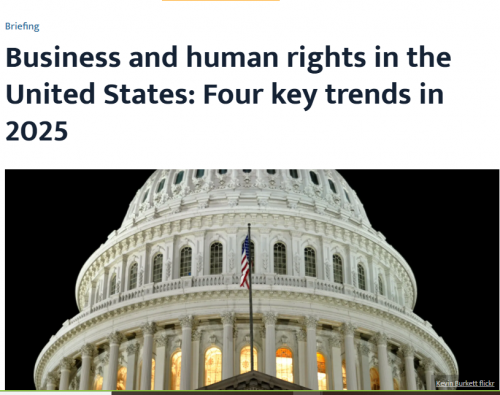
After over two decades of incomplete but overall significant progress on corporate respect for human rights, we are at a crossroads. With the global rise of authoritarianism, narrow economic nationalisms, and corporate capture, and a rapidly changing US context, we’re facing real risk of roll-backs by business on their longstanding human rights commitments.
https://www.business-humanrights.org/en/from-us/us-corporate-human-right...
https://www.business-humanrights.org/en/from-us/briefings/business-and-h...
But our analysis of top US companies’ policies and commitments across five sectors revealed that, beyond well-documented roll-backs like DEI (diversity, equity, and inclusion) and some climate commitments, companies are largely maintaining their human rights policies and commitments on paper.
A closer examination of actions by US companies amidst shifts in policies, regulations, and rhetoric in the US and across the globe, however, reveals a more complex and concerning picture. In accompanying analysis, we find that the current context brings heightened risk, which brings heightened responsibility.
- Our new US corporate human rights index examines the human rights policies and commitments of 54 US companies in the technology, apparel, extractives, automotive and agrifood sectors. The purpose: to identify any major changes made in 2025. We also analyze developments over the past year related to business and human rights in the US.
- Our finding: Companies’ core human rights policies and commitments remain largely unchanged, in contrast to some shifts in human rights-related AI and content moderation policies, and well-documented rollbacks on commitments related to DEI and climate. See all findings here.
- While commitments haven’t changed on paper, our analysis of companies’ responses to changing policies, regulations and rhetoric in the US paints a more alarming picture, which we explore in the four trends outlined below.
- US tech companies’ increasing and unregulated power poses a particular threat. Smart incentives and mandatory human rights due diligence are the obvious starting points to reverse this trend, coupled with liability for tech companies that don’t comply.
- Responsible business across sectors is still possible, and there have been some modest examples of companies and industry associations defending the business and human rights agenda. We need more companies not only to stay the course on policy, but to meet the moment by defending the institutions and initiatives that support responsible business and by strengthening the implementation of their existing commitments.
Using this index
This index shares overviews of the human rights policies, commitments, memberships and disclosures (as of 31 August 2025) for 54 US-headquartered companies across the technology, apparel, extractives, automotive, and agrifood (food/beverage and agriculture) sectors. We hope that civil society organizations and investors will use these reviews in their advocacy and efforts to better understand the state of these companies' human rights commitments and any changes over time. The Resource Centre will periodically update these reviews.
Our reviews are not evaluations of the quality of companies’ policies and commitments, nor do we offer commentary on whether a company's statement meets a threshold to “count” toward an indicator. Rather, our objective is to capture companies’ statements related to a topic at a particular moment in time and to monitor any changes over time.









